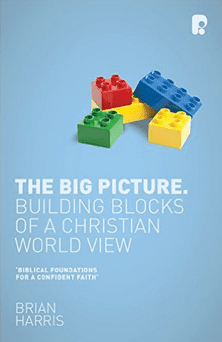 It would be a good exercise for students in a classroom to ponder which thoughts are the most vital for comprehending how Christians think and understand the world that exists. What would your top five elements be? What are the building blocks of such a worldview? Yes, some don’t like the expression worldview, but many of us embraced “worldview” not from apologists but from someone like N.T. Wright (in his The New Testament and the People of God) or from Brian Walsh and J. Richard Middleton.
It would be a good exercise for students in a classroom to ponder which thoughts are the most vital for comprehending how Christians think and understand the world that exists. What would your top five elements be? What are the building blocks of such a worldview? Yes, some don’t like the expression worldview, but many of us embraced “worldview” not from apologists but from someone like N.T. Wright (in his The New Testament and the People of God) or from Brian Walsh and J. Richard Middleton.
Brian Harris, The Big Picture: Building Blocks of a Christian World View, attempts to build a worldview through such building blocks, and here is his list:
1. The Universe: Accidental or Intentional
2. Humanity: Tragedy and Triumph
3. Amazing Grace: A Cross-Shaped Reality
4. Because the Three are One: Trinity and Community
5. All Creatures Great and Small: Building a World with a Better Name
6. Ever Hopeful: Living in the Light of Eternity
There you go: six elements. Pondering why this world exists, pondering what humans are like, pondering a cross-shaped view of life, pondering the Trinity as creating community inherent to creation, the world around us and our summons to seek peace and justice, and living with hope.
Let’s consider the first. Is life random or is there a purpose to life? Many would say this is one of the hardest questions to get postmoderns even to ask and seek an answer for. At work in this is another question: Are we pursuing joy and happiness — in a wide-ranging way — or are we pursuing truth? Many have abandoned the latter and so are more shaped by the former. Nothing more expresses this than the person says, “This is what I believe because this is what I believe?” In other words, they are the captain of their own ship and they steer their own boat where their light leads them. There’s something to thinking for yourself; there’s also something called pursuing truth. The former helps the latter, but many get lost in the former and abandon the latter.
If the world is random, the I takes charge and happiness becomes the aim; if the world is purposed by God, the God of the universe takes charge and truth is the aim. The Bible’s account in Genesis provokes the “Why?” question, not the “How?” question. Well, Yes, the How question is “God” but that’s not what we mean by the How? question; we tend to think in terms of science. The Bible’s about Why?
The Bible’s Why question presses us into the Bible’s characters, the Bible’s story, the Bible’s plot, and the Bible’s resolutions. Meaning is found in that narrative. The original creation is threatened by sin and sin’s resolution is worked out in the narrative by way of covenant with God.
The narrative’s God: creative, powerful, intentional, relational, observant, involved, confronting, emotional, protective, just, merciful, persistent. The narrative’s God image-bearers: humans.
He’s right: if that is what the God of the narrative is like, humans should be … like God!
I have to tell you: theology done like this is far more biblical than theology done through the classical loci, or topics.














